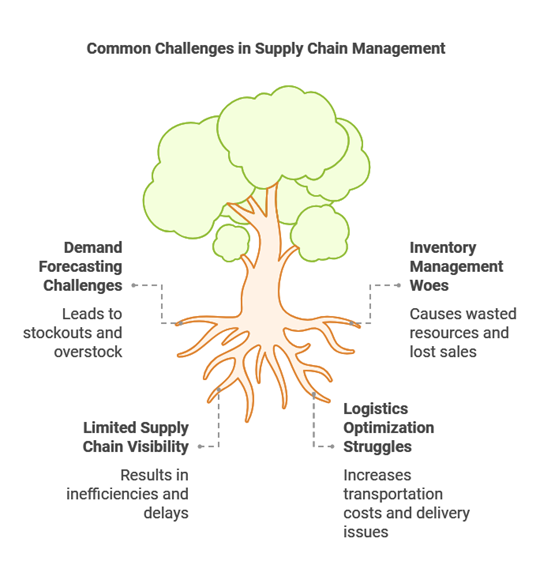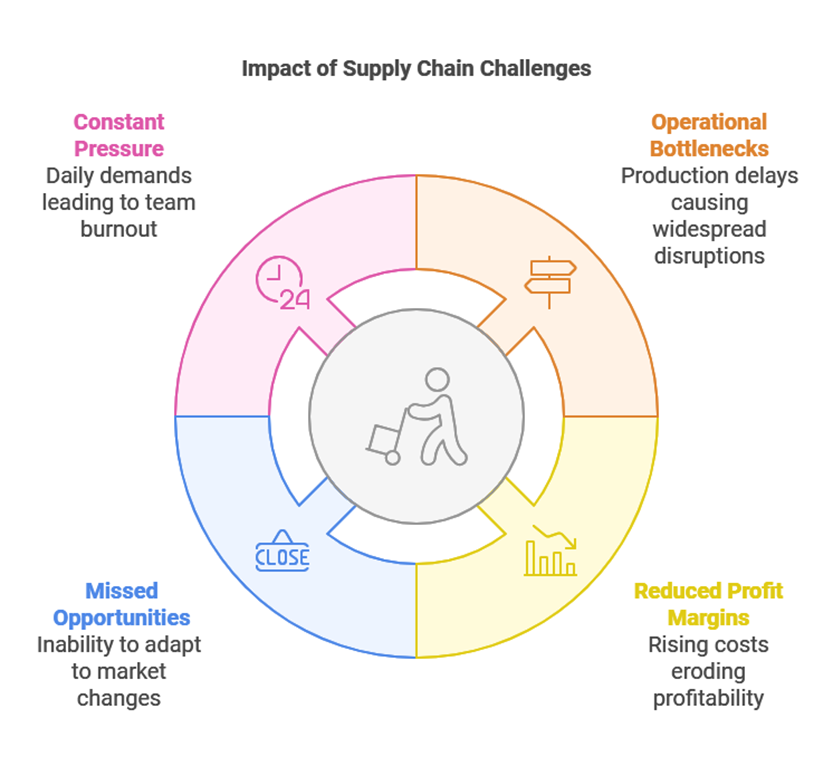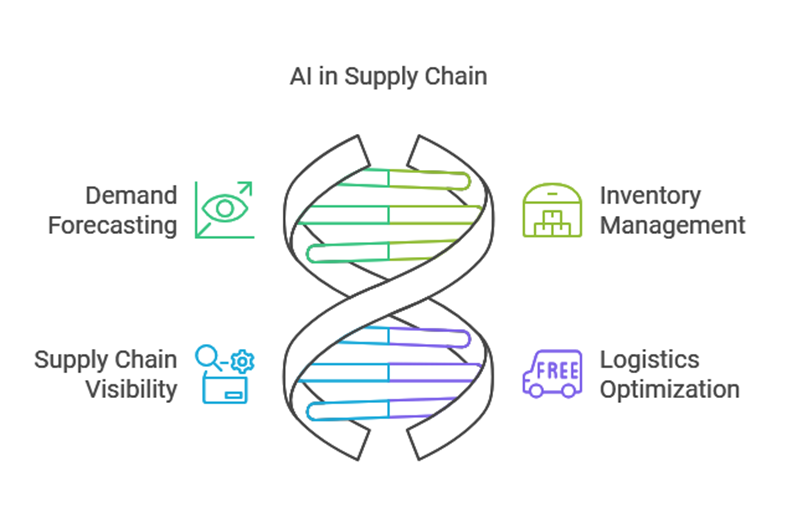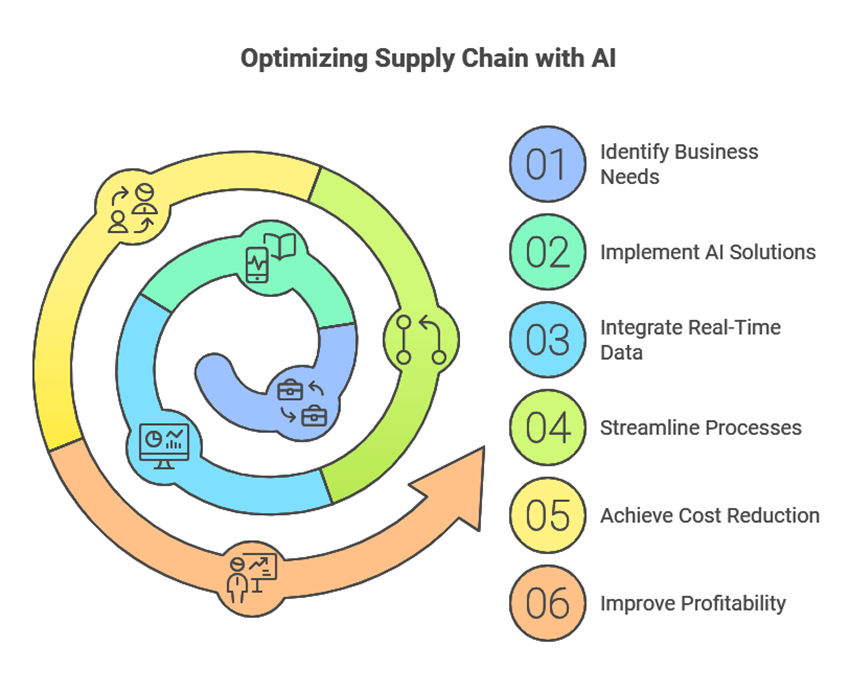In the fast-paced world of supply chain management, staying ahead of potential disruptions is crucial. While the flow of goods from vendors to retailers is central to business operations, challenges are inevitable. From unpredictable demand to rising logistics costs, many companies find themselves battling inefficiencies that hamper growth. If your business is struggling with these issues, you're not alone.
In this article, we’ll break down the most common supply chain challenges, explain why they matter, and explore how AI can offer transformative solutions to optimize your operations and improve profitability.
1. The Common Struggles in Supply Chain Management
Running a successful supply chain requires precision, foresight, and coordination. However, the most common challenges can put strain on your operations and bottom line. Here are some key hurdles businesses face:
Demand Forecasting Challenges: Demand fluctuations often cause a "bullwhip effect," where small changes in demand lead to bigger problems down the line. Predicting this demand with accuracy is difficult but crucial. AI can improve demand forecasting accuracy by analyzing vast amounts of historical data, market trends, and external factors, leading to a 20% reduction in stockouts and a 15% decrease in overstock.
Inventory Management Woes: Managing inventory is a delicate balancing act. Overstock leads to wasted resources, while stockouts mean missed sales and unhappy customers. Keeping the right amount of stock at all times can seem impossible. AI-driven inventory systems can monitor and adjust stock levels in real-time, reducing holding costs by 10% and minimizing waste.
Limited Supply Chain Visibility: Without real-time insights, it’s hard to track shipments, identify potential disruptions, and manage inventory across multiple locations. A lack of visibility leads to inefficiencies that slow down the whole process. Enhanced visibility through AI provides real-time insights, reducing lead times by 25% and improving on-time delivery rates by 30%.
Logistics Optimization Struggles: Getting products to the right place at the right time is critical, but with rising transportation costs and unpredictable delivery schedules, many businesses face difficulties in managing logistics efficiently. AI can optimize transportation routes and delivery schedules, resulting in a 15% reduction in fuel costs and a 20% improvement in delivery speed.
2. Why These Challenges Matter
At first glance, these supply chain issues may seem like mere inconveniences, but their impact can be significant:
Operational Bottlenecks: Delayed or inaccurate demand forecasts can create backlogs in production, forcing businesses to scramble and causing disruptions that ripple through the entire supply chain.
Reduced Profit Margins: Rising costs from overstocking, inefficient logistics, and lack of visibility eat into profitability, leaving businesses wondering if they’re maximizing their potential.
Missed Opportunities: Without an agile supply chain, businesses miss out on opportunities to respond to changing customer demands, emerging trends, or potential cost-saving measures.
Constant Pressure: Without a data-driven approach, businesses struggle to keep up with day-to-day supply chain demands. This pressure can lead to burnout and inefficiency, especially in smaller teams.
3. Turning the Tide: How AI Can Transform Your Supply Chain
AI technologies have the potential to revolutionize supply chain management. Here’s how AI can help your business overcome these common challenges:
Smarter Demand Forecasting: AI uses advanced algorithms to analyze historical data, market trends, and external factors, improving the accuracy of demand forecasts. By providing more reliable predictions, AI reduces stockouts and overstock, making inventory management far more predictable.
Optimized Inventory Management:AI can continuously monitor and adjust stock levels, ensuring you maintain an optimal inventory at all times. Automated systems streamline reordering and help eliminate waste, keeping your costs low and inventory turnover high.
Enhanced Supply Chain Visibility: AI-powered systems provide real-time insights across the entire supply chain. Whether it's tracking shipments, monitoring inventory, or anticipating delays, AI ensures that you can act proactively rather than reactively.
Efficient Logistics Optimization: By considering factors such as traffic patterns, weather conditions, and fuel consumption, AI can optimize transportation routes, reducing costs and improving delivery speeds. This not only minimizes logistics expenses but also ensures timely deliveries.
4. Why Partnering with EcomXpert Can Help You Stay Ahead
At EcomXpert, we specialize in helping businesses harness the power of AI to optimize their supply chain operations. Here’s how we can make a difference:
Tailored Solutions for Your Business: We understand that each supply chain is unique. Our team works closely with you to implement AI solutions that fit your specific needs, enhancing both efficiency and profitability.
Real-Time Data Integration:By integrating AI-powered tools, we provide your team with real-time data insights, allowing for smarter decision-making and greater responsiveness.
Streamlining Processes: We identify and eliminate inefficiencies in your supply chain, from forecasting to logistics, helping you save time and money while improving overall performance.
Cost Reduction: Through advanced inventory management and logistics optimization, we help you reduce overhead costs, allowing for reinvestment into business growth.





Write a comment